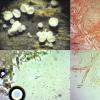
29-08-2025 05:16
 Francois Guay
Francois Guay
I think I may have found the teleomorph of Dendros

30-01-2026 21:20
Arnold BüschlenBryocentria brongniartii und B. metzgeriae mit ihr

21-01-2026 16:32
Gernot FriebesHi,I need your help with some black dots on a lich

07-12-2015 14:17
 Zugna Marino
Zugna Marino
Buon giorno a tutti, ad un primo momento, non ess

29-01-2026 10:04
 Jean-Paul Priou
Jean-Paul Priou
Bonjour à tous, Marcel LECOMTE président de L'A
Nemania serpens hyphomecyete
Steve Clements,
05-05-2015 15:53
This white hyphomycete quickly appeared within a week on a specimen of Nemania serpens from the Longshaw Estate, which was kept in an icubator. I was interested to know whether this is a parasite or an anamorph of the Nemania, as the pyrenomycete continued to produce ascopspores in profusion for a few weeks, together with the growth of the hyphomycete. However, the hyphomycete appears to be filling the empty chambers of the Nemania so I assume it's a parasite ie another species of fungus.
The conidiophores are white, bushy and about 1mm high. The hyphae septate, 2-3 um wide, with phialide-like mostly dichotomous branching. Conidia are pinched off the tips of the hyphae and are oval, hyaline, 2-4 x 2-3.
This doesn't seem to be listed as a fungus on "Hypoxylon" in Ellis and Ellis.
Kind regards,
Steve
Jacques Fournier,
05-05-2015 18:25

Re : Nemania serpens hyphomecyete
Hi Steve,
at first glance it does not look like the geniculosporium-like anamorph of N. serpens, which is typically greenish grey and not synnematous. However the conidiogenous cells and the conidia might fit. I attach the original description of geniculosporium so that you make your own opinion.
Cheers,
Jacques
at first glance it does not look like the geniculosporium-like anamorph of N. serpens, which is typically greenish grey and not synnematous. However the conidiogenous cells and the conidia might fit. I attach the original description of geniculosporium so that you make your own opinion.
Cheers,
Jacques
Chris Yeates,
05-05-2015 19:42

Re : Nemania serpens hyphomecyete
Hi Steve
try Calcarisporium arbuscula, a common parasite of various groups of fungi including many genera of the Xylariales. See Malcolm Storey's series of images at: http://www.discoverlife.org/mp/20q?search=Calcarisporium+arbuscula&mobile=iPhone
best wishes
Chris
try Calcarisporium arbuscula, a common parasite of various groups of fungi including many genera of the Xylariales. See Malcolm Storey's series of images at: http://www.discoverlife.org/mp/20q?search=Calcarisporium+arbuscula&mobile=iPhone
best wishes
Chris
Steve Clements,
06-05-2015 10:34
Re : Nemania serpens hyphomecyete
Many thanks Jacques and Chris,
I think this is more likely Calcarisporium arbuscula as you suggest Chris - I was put off by the drawing in Ellis and Ellis as the branching shown is more open. Malcolm Storey's micrograph's are a far better match. I named it with some hesitation on a Lachnum species last year in April (Rough Wood, Longshaw) - my images are getting better with help from FungiJohn and my photographer mate Dave.
Kind regards,
Steve
I think this is more likely Calcarisporium arbuscula as you suggest Chris - I was put off by the drawing in Ellis and Ellis as the branching shown is more open. Malcolm Storey's micrograph's are a far better match. I named it with some hesitation on a Lachnum species last year in April (Rough Wood, Longshaw) - my images are getting better with help from FungiJohn and my photographer mate Dave.
Kind regards,
Steve



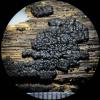
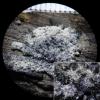
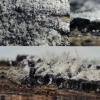
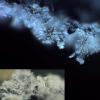
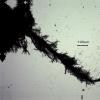
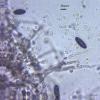
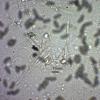
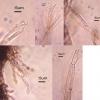
 Geniculosporium-serpens-0001.pdf
Geniculosporium-serpens-0001.pdf